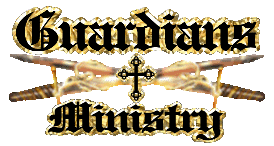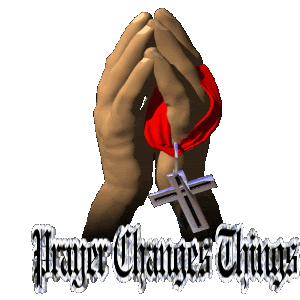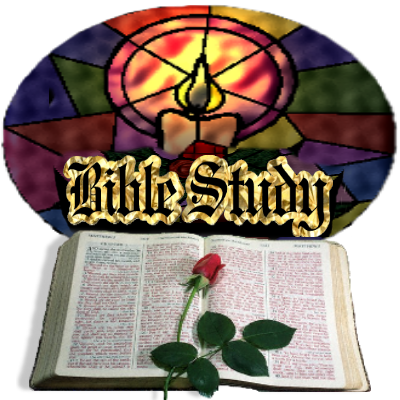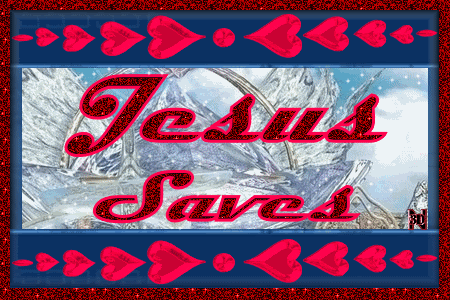Spreading God's Love Thru Prayer
Let's pray before we begin: Father, God, Yahweh, my All in all, Love, Light, Life and more, we thank you for the free gift of the Holy Spirit, as we have asked for it. Thank you for leading and guiding us into all truth, Holy Spirit, and thank you Jesus for being touched by our feelings and infirmities, and for your sacrifice on Calvary. Amen.
----------------------------------------------------------------------------
Let's take a look at Psalm 23 to help us learn and grow in the truth of the Lord God. In the 3 versions, NKJV, AMP, Message.
21st Century King James Version (KJ21) Passage Psalm 23 :1The LORD is my shepherd; I shall not want.
2He maketh me to lie down in green pastures; He leadeth me beside the still waters.
3He restoreth my soul; He leadeth me in the paths of righteousness for His name's sake.
4Yea, though I walk through the valley of the shadow of death, I will fear no evil; for Thou art with me; Thy rod and Thy staff, they comfort me.
5Thou preparest a table before me in the presence of mine enemies; Thou anointest my head with oil; my cup runneth over.
6Surely goodness and mercy shall follow me all the days of my life; and I will dwell in the house of the LORD for ever.
Amplified Bible (AMP) Passage Psalm 23 :A Psalm of David.
1THE LORD is my Shepherd [to feed, guide, and shield me], I shall not lack.
2He makes me lie down in [fresh, tender] green pastures; He leads me beside the still and restful waters.(A)
3He refreshes and restores my life (my self); He leads me in the paths of righteousness [uprightness and right standing with Him--not for my earning it, but] for His name's sake.
4Yes, though I walk through the [deep, sunless] valley of the shadow of death, I will fear or dread no evil, for You are with me; Your rod [to protect] and Your staff [to guide], they comfort me.
5You prepare a table before me in the presence of my enemies. You anoint my head with[a]oil; my [brimming] cup runs over.
6Surely or only goodness, mercy, and unfailing love shall follow me all the days of my life, and through the length of my days the house of the Lord [and His presence] shall be my dwelling place.
Footnotes:
- (a) Psalm 23:5 It is difficult for those living in a temperate climate to appreciate, but it was customary in hot climates to anoint the body with oil to protect it from excessive perspiration. When mixed with perfume, the oil imparted a delightfully refreshing and invigorating sensation. Athletes anointed their bodies as a matter of course before running a race. As the body, therefore, anointed with oil was refreshed, invigorated, and better fitted for action, so the Lord would anoint His "sheep" with the Holy Spirit, Whom oil symbolizes, to fit them to engage more freely in His service and run in the way He directs--in heavenly fellowship with Him.
Cross References:- (A) Psalm 23:2 : Rev 7:17
The Message (MSG) Passage Psalm 23 : A David Psalm
1 -3 God, my shepherd! I don't need a thing.
You have bedded me down in lush meadows,
you find me quiet pools to drink from.
True to your word,
you let me catch my breath
and send me in the right direction.
4 Even when the way goes through
Death Valley,
I'm not afraid
when you walk at my side.
Your trusty shepherd's crook
makes me feel secure.
5 You serve me a six-course dinner
right in front of my enemies.
You revive my drooping head;
my cup brims with blessing.
6 Your beauty and love chase after me
every day of my life.
I'm back home in the house of God
for the rest of my life.
------------------------------------------------------------
Ok, let's look at some insights on this Psalm - from other scriptures and commentaries:
EXPOSITION - Charles Spurgeon - The Treasure of David Bible Commentary
Verse 1. The Lord is my shepherd. What condescension is this, that the infinite Lord assumes towards his people the office and character of a Shepherd! It should be the subject of grateful admiration that the great God allows himself to be compared to anything which will set forth his great love and care for his own people.
David had himself been a keeper of sheep, and understood both the needs of the sheep and the many cares of a shepherd. He compares himself to a creature weak, defenceless, and foolish, and he takes God to be his Provider, Preserver, Director, and, indeed, his everything.
No man has a right to consider himself the Lord's sheep unless his nature has been renewed for the scriptural description of unconverted men does not picture them as sheep, but as wolves or goats.
A sheep is an object of property, not a wild animal; its owner sets great store by it, and frequently it is bought with a great price. It is well to know, as certainly David did, that we belong to the Lord. There is a noble tone of confidence about this sentence. There is no "if" nor "but", nor even "I hope so"; but he says, "The Lord is my shepherd." We must cultivate the spirit of assured dependence upon our heavenly Father.
The sweetest word of the whole is that monosyllable, "My." He does not say, "The Lord is the shepherd of the world at large, and leadeth forth the multitude as his flock", but "The Lord is my shepherd;" if he be a Shepherd to no one else, he is a Shepherd to me; he cares for me, watches over me, and preserves me. The words are in the present tense. Whatever be the believer's position, he is even now under the pastoral care of Jehovah.
The next words are a sort of inference from the first statement -- they are sententious and positive -- I shall not want. I might want otherwise, but when the Lord is my Shepherd he is able to supply my needs, and he is certainly willing to do so, for his heart is full of love, and therefore "I shall not want."
I shall not lack for temporal things. Does he not feed the ravens, and cause the lilies to grow? How, then, can he leave his children to starve? I shall not want for spirituals, I know that his grace will be sufficient for me. Resting in him he will say to me, "As thy day so shall thy strength be."
I may not possess all that I wish for, but "I shall not want." Others, far wealthier and wiser than I, may want, but "I shall not." "The young lions do lack, and suffer hunger: but they that seek the Lord shall not want any good thing."
"It is not only "I do not want," but "I shall not want." Come what may, if famine should devastate the land, or calamity destroy the city, "I shall not want." Old age with its feebleness shall not bring me any lack, and even death with its gloom shall not find me destitute.
I have all things and abound; not because I have a good store of money in the bank, not because I have skill and wit with which to win my bread, but because "The Lord is my shepherd." The wicked always want, but the righteous never; a sinner's heart is far from satisfaction, but a gracious spirit dwells in the palace of content."
------------------------------------------------------------------------------------------
Isaiah 40:11
11 He shall feed his flock like a shepherd : he shall gather the lambs with his arm, and carry them in his bosom, and shall gently lead those that are with young .
John 10:27
27 My sheep hear my voice, and I know them, and they follow me:
Psalm 78:70-72
70 He also chose David his servant, and took him from the sheepfolds;
71 From following the ewes that had young He brought him to shepherd Jacob His people
72 So he shepherded them according to the integrity of his heart and guided them by the skillfulness of his hands.
Psalm 80:1
Give ear, O Shepherd of Israel, you who lead Joseph like a flock; You who dwell between the cherubim, shine forth!
-----------------------------------------------------------------------------------------
COMMENTARY: MATTHEW HENRY
See here, 1. The great care that God takes of believers. He is their shepherd, and they may call him so. Time was when David was himself a shepherd; he was taken from following the ewes great with young (Ps. 78:70, 71), and so he knew by experience the cares and tender affections of a good shepherd towards his flock. He remembered what need they had of a shepherd, and what a kindness it was to them to have one that was skilful and faithful; he once ventured his life to rescue a lamb.
By this therefore he illustrates God’s care of his people; and to this our Saviour seems to refer when he says, I am the shepherd of the sheep; the good shepherd, Jn. 10:11. He that is the shepherd of Israel, of the whole church in general (Ps. 80:1), is the shepherd of every particular believer; the meanest is not below his cognizance, Isa. 40:11. He takes them into his fold, and then takes care of them, protects them, and provides for them, with more care and constancy than a shepherd can, that makes it his business to keep the flock.
If God be as a shepherd to us, we must be as sheep, inoffensive, meek, and quiet, silent before the shearers, nay, and before the butcher too, useful and sociable; we must know the shepherd’s voice, and follow him. 2. The great confidence which believers have in God: "If the Lord is my shepherd, my feeder, I may conclude I shall not want any thing that is really necessary and good for me.’’
If David penned this psalm before his coming to the crown, though destined to it, he had as much reason to fear wanting as any man. Once he sent his men a begging for him to Nabal, and another time went himself a begging to Ahimelech; and yet, when he considers that God is his shepherd, he can boldly say, I shall not want. Let not those fear starving that are at God’s finding and have him for their feeder. More is implied than is expressed, not only, I shall not want, but, "I shall be supplied with whatever I need; and, if I have not every thing I desire, I may conclude it is either not fit for me or not good for me or I shall have it in due time.’’
II. From his performing the office of a good shepherd to him he infers that he needs not fear any evil in the greatest dangers and difficulties he could be in, v. 2-4. He experiences the benefit of God’s presence with him and care of him now, and therefore expects the benefit of them when he most needs it.
See here,1. The comforts of a living saint. God is his shepherd and his God—a God all-sufficint to all intents and purposes. David found him so, and so have we. See the happiness of the saints as the sheep of God’s pasture. (1.) They are well placed, well laid: He maketh me to lie down in green pastures.We have the supports and comforts of this life from God’s good hand, our daily bread from him as our Father. The greatest abundance is but a dry pasture to a wicked man, who relishes that only in it which pleases the senses; but to a godly man, who tastes the goodness of God in all his enjoyments, and by faith relishes that, though he has but little of the world, it is a green pasture, Ps. 37:16; Prov. 15:16, 17.
God’s ordinances are the green pastures in which food is provided for all believers; the word of life is the nourishment of the new man. It is milk for babes, pasture for sheep, never barren, never eaten bare, never parched, but always a green pasture for faith to feed in. God makes his saints to lie down; he gives them quiet and contentment in their own minds, what ever their lot is; their souls dwell at ease in him, and that makes every pasture green. Are we blessed with the green pastures of the ordinances? Let us not think it enough to pass through them, but let us lie down in them, abide in them; this is my rest for ever.
It is by a constancy of the means of grace that the soul is fed. (2.) They are well guided, well led. The shepherd of Israel guides Joseph like a flock; and every believer is under the same guidance: He leadeth me beside the still waters. Those that feed on God’s goodness must follow his direction; he leads them by his providence, by his word, by his Spirit, disposes of their affairs for the best, according to his counsel, disposes their affections and actions according to his command, directs their eye, their way, and their heart, into his love.
The still waters by which he leads them yield them, not only a pleasant prospect, but many a cooling draught, many a reviving cordial, when they are thirsty and weary. God provides for his people not only food and rest, but refreshment also and pleasure.
The consolations of God, the joys of the Holy Ghost, are these still waters, by which the saints are led, streams which flow from the fountain of living waters and make glad the city of our God. God leads his people, not to the standing waters which corrupt and gather filth, not to the troubled sea, nor to the rapid rolling floods, but to the silent purling waters; for the still but running waters agree best with those spirits that flow out towards God and yet do it silently.
The divine guidance they are under is stripped of its metaphor (v. 3): He leadeth me in the paths of righteousness, in the way of my duty; in that he instructs me by his word and directs me by conscience and providence. Theses are the paths in which all the saints desire to be led and kept, and never to turn aside out of them. And those only are led by the still waters of comfort that walk in the paths of righteousness.
The way of duty is the truly pleasant way. It is the work of righteousness that is peace. In these paths we cannot walk unless God both lead us into them and lead us in them.
(3.) They are well helped when any thing ails them: He restoreth my soul. [1.] "He restores me when I wander.’’ No creature will lose itself sooner than a sheep, so apt is it to go astray, and then so unapt to find the way back.
The best saints are sensible of their proneness to go astray like lost sheep (Ps. 119:176); they miss their way, and turn aside into by-paths; but when God shows them their error, gives them repentance, and brings them back to their duty again, he restores the soul; and, if he did not do so, they would wander endlessly and be undone. When, after one sin, David’s heart smote him, and, after another, Nathan was sent to tell him, Thou art the man, God restored his soul. Though God may suffer his people to fall into sin, he will not suffer them to lie still in it.
[2.] "He recovers me when I am sick, and revives me when I am faint, and so restores the soul which was ready to depart.’’ He is the Lord our God that heals us, Ex. 15:26. Many a time we should have fainted unless we had believed; and it was the good shepherd that kept us from fainting.
2. See here the courage of a dying saint (v. 4): "Having had such experience of God’s goodness to me all my days, in six troubles and in seven, I will never distrust him, no, not in the last extremity; the rather because all he has done for me hitherto was not for any merit or desert of mine, but purely for his name’s sake, in pursuance of his word, in performance of his promise, and for the glory of his own attributes and relations to his people. That name therefore shall still be my strong tower, and shall assure me that he who has led me, and fed me, all my life long, will not leave me at last.’’
Here is,(1.) Imminent danger supposed: "Though I walk through the valley of the shadow of death, that is, though I am in peril of death, though in the midst of dangers, deep as a valley, dark as a shadow, and dreadful as death itself,’’ or rather, "though I am under the arrests of death, have received the sentence of death within myself, and have all the reason in the world to look upon myself as a dying man, yet I am easy.’’ Those that are sick, those that are old, have reason to look upon themselves as in the valley of the shadow of death.
Here is one word indeed which sounds terrible; it is death, which we must all count upon; there is no discharge in that war. But, even in the supposition of the distress, there are four words which lessen the terror:—It is death indeed that is before us; but, [1.] It is but the shadow of death; there is no substantial evil in it; the shadow of a serpent will not sting nor the shadow of a sword kill. [2.] It is the valley of the shadow, deep indeed, and dark, and dirty; but the valleys are fruitful, and so is death itself fruitful of comforts to God’s people.
[3.] It is but a walk in this valley, a gentle pleasant walk. The wicked are chased out of the world, and their souls are required; but the saints take a walk to another world as cheerfully as they take their leave of this. [4.] It is a walk through it; they shall not be lost in this valley, but get safely to the mountain of spices on the other side of it.(2.) This danger made light of, and triumphed over, upon good grounds.
Death is a king of terrors, but not to the sheep of Christ; they tremble at it no more than sheep do that are appointed for the slaughter. "Even in the valley of the shadow of death I will fear no evil. None of these things move me.’’
Note, A child of God may meet the messengers of death, and receive its summons with a holy security and serenity of mind. The sucking child may play upon the hole of this asp; and the weaned child, that, through grace, is weaned from this world, may put his hand upon this cockatrice’s den, bidding a holy defiance to death, as Paul, O death! where is thy sting? And there is ground enough for this confidence,
[1.] Because there is no evil in it to a child of God; death cannot separate us from the love of God, and therefore it can do us no real harm; it kills the body, but cannot touch the soul. Why should it be dreadful when there is nothing in it hurtful?
[2.] Because the saints have God’s gracious presence with them in their dying moments; he is then at their right hand, and therefore why should they be moved? The good shepherd will not only conduct, but convoy, his sheep through the valley, where they are in danger of being set upon by the beasts of prey, the ravening wolves; he will not only convoy them, but comfort then when they most need comfort. His presence shall comfort them:Thou art with me. His word and Spirit shall comfort them—his rod and staff, alluding to the shepherd’s crook, or the rod under which the sheep passed when they were counted (Lev. 27:32), or the staff with which the shepherds drove away the dogs that would scatter or worry the sheep.
It is a comfort to the saints, when they come to die, that God takes cognizance of them (he knows those that are his), that he will rebuke the enemy, that he will guide them with his rod and sustain them with his staff. The gospel is called the rod of Christ’s strength (Ps. 110:2), and there is enough in that to comfort the saints when they come to die, and underneath them are the everlasting arms.
III. From the good gifts of God’s bounty to him now he infers the constancy and perpetuity of his mercy, v. 5, 6. Here we may observe,1. How highly he magnifies God’s gracious vouchsafements to him (v. 5): "Thou preparest a table before me; thou hast provided for me all things pertaining both to life and godliness, all things requisite both for body and soul, for time and eternity:’’ such a bountiful benefactor is God to all his people; and it becomes them abundantly to utter his great goodness, as David here, who acknowledges,
(1.) That he had food convenient, a table spread, a cup filled, meat for his hunger, drink for his thirst.
(2.) That he had it carefully and readily provided for him. His table was not spread with any thing that came next to hand, but prepared, and prepared before him.
(3.) That he was not stinted, was not straitened, but had abundance: "My cup runs over, enough for myself and my friends too.’’
(4.) That he had not only for necessity, but for ornament and delight: Thou anointest my head with oil. Samuel anointed him king, which was a certain pledge of further favor; but this is rather an instance of the plenty with which God had blessed him, or an allusion to the extraordinary entertainment of special friends, whose heads they anointed with oil, Lu. 7:46.
-----------------------------------------------------------------------------------
Finally, I point to the 'valley of the shadow of death' - and share with you what the Holy Spirit enlightened me with. First a question: What makes a shadow? Answer: LIGHT. So walking through the valley of the shadow of death the Lord is with us, and the Lord is Light which 'makes' shadows - therefore this walk through this valley is a shadow - death is a shadow to those who are the Lord's, through born again-new birth, gifting of the Holy Spirit, and the anointing of Christ - stepping onto eternity. hmmm.
Any questions please let me know, thanks and remember to journal - !!!
Views: 15
© 2026 Created by Guardian.
Powered by
![]()




 Guardians Prayer Warriors if you would like to go to our Facebook page please click the buttons. If you would like to open up a Guardians Prayer Warriors group on a different site please contact Guardians Ministry so that we may put the name of your site on the page and you can use Guardians Prayer Warrior tags.
Guardians Prayer Warriors if you would like to go to our Facebook page please click the buttons. If you would like to open up a Guardians Prayer Warriors group on a different site please contact Guardians Ministry so that we may put the name of your site on the page and you can use Guardians Prayer Warrior tags.






